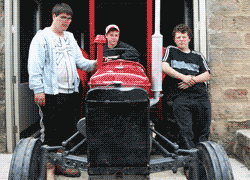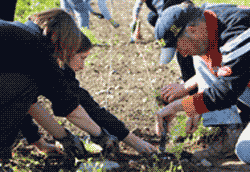Care farming could put £149m/year into the rural economy

Recovering alcoholic Paul Bird believes farming saved him from the bottle. For the past two years, he has lived and worked at Risdon Farm, a 130ha (320-acre) dairy unit near Okehampton, Devon.
“It’s good to have a purpose in what you do,” Mr Bird told Farmers Weekly. “I enjoy working here – it’s much better than regular rehab where you often find yourself at a loose end with nothing to do between therapy sessions.”
Risdon Farm is a care farm – a commercial farm which promotes the physical and mental well-being of people with a range of disabilities, or medical or social needs. And Mr Bird has just signed up to stay for a further 12 months.
There are some 40 similar farms across the UK, offering therapeutic work-based learning and rehabilitation services to more than 3000 people every week, according to recent evidence from the University of Essex.
Care farming is a growing phenomenon. But the UK still lags behind countries such as the Netherlands and Norway, where more than 1000 care farms are seen as vital healthcare providers that also generate an additional source of agricultural income.
A powerful injection of funding and backing from policymakers is needed if care farming is to realise its potential in the UK, says university researcher Rachel Hine. “Amazingly, it’s not on the health and social care agenda.”
The Dutch experience suggests that the potential development of care farming in the UK is huge.
Research published last November has shown that care farming is by far the fastest-growing farm diversification in the Netherlands.
In 10 years, the number of Dutch farms involved in care farming has grown from 75 to more than 800. If developments here follow a similar trend, care farming could be worth more than £149m a year to the UK rural economy within a decade.
A single care farm operation could generate revenue of £52,517 annually, according to calculations by the National Care Farming Initiative (NCFI), an organisation based at Harper Adams University College, Shropshire.
The NCFI highlights the work taking place on farms offering health, education and welfare services for people with a range of specialist or particular needs. It also provides networking and research opportunities for its members.
Care farms are very much commercial working farms, explains NCFI policy officer Jon Dover. “Meaningful work combined with connection to other people and nature is a winning and cost-effective combination.”
A Care Farming Practitioner Steering Group, formally established late last year, has now brought together 12 of the sector’s most experienced practitioners. Run by farmers, part of its work is to lobby for more government support for care farming.
Joint chairman Gareth Gaunt of Carlshead Farm, Wetherby, hopes the group will be instrumental in the development of what he describes as one of the most exciting diversification opportunities available to British farmers.
“Farming and rural communities can uniquely help and improve the health and social well-being of many individuals in need of assistance and support. Visiting and completing tasks on a working farm can be life-changing for many people.”
Fund-raising, however, remains an issue. Many care farms face an ongoing battle to secure an adequate income, with some farmers receiving as little as £19 from social services each time a client visits the farm. The figure needs to be nearer £100.
It is for this reason that Mr Gaunt stresses care farming must be treated as a business if it is to work properly. “Too many care farms are underpaid. There needs to be better understanding of what we provide.”
A working farm is vital. “Without the farming side, you may as well go and get care in the city. Caring works a lot better in the countryside. But not enough people realise that the routine of farming is important in the way people respond.”
Gradually, policymakers are taking notice. Care farming is a genuine opportunity, believes Tony Cooke, who chairs the organisation overseeing the government’s sustainable farming and food strategy in the Yorkshire and Humber region.
“As we move into a new era of being market-focused as a farming industry, care farming is an imaginative way of harnessing all of the farm’s resources while delivering real benefits to the local community.”
What is care farming?
The therapeutic qualities of living in the countryside have long been recognised. Compared to the impersonal bustle of the city, rural life operates at a more relaxed pace, frequently based around the weather and the seasons.
But only recently has the concept of care farming – which combines care of the land with care of people – started to gain acceptance. It works by using farms to promote mental and physical wellbeing more efficiently than traditional social services.
Although still in its infancy in the UK, more commercial farms are offering on-farm health, education and welfare services for people who would benefit from a more structured lifestyle and meaningful work in a natural environment.
Usually referred to as residents or clients rather than patients, many care farm participants soon experience improvements to their physical, mental and spiritual health and well-being.
Becoming involved with activities on a working farm can be especially beneficial for rehabilitation and re-education for disaffected youths. In the UK, care farms range in size from under 1ha to over 360ha and offer care to 3500 participants per week.
Case study: Carlshead Project, West Yorkshire

Carlshead is an alternative educational training project, based on a 200ha (500 acre) farm near Wetherby. It helps teenagers with a range of different needs, including learning or behavioural difficulties and those not attending school.
There is a strong emphasis on personal development. Youngsters are offered lessons in tractor mechanics, restoration and driving, coarse fishing, small animal care, and the basics of horse care, stable management and equine psychology.
Students work in small group sizes towards accreditations from the Open College Network. Courses are mostly practical with a small amount of written work. Tuition takes place within a complex of converted stone barns.
Carlshead is VAT-registered as a training facility, rather than as a school. This was deemed vital to avoid being at a 17.5% disadvantage as the £12/square foot charged in rent by the farm is VAT-able and comprises a large part of its expenses.
Case Study: Gilead Foundations, Devon
Gilead Foundations is a Christian rehabilitation centre, based on a 130ha (320 acre) dairy farm near Okehampton. It helps people battling with addiction problems, such as drug abuse, alcoholism and related issues.
Up to 30 residents live on the care farm at any one time. Often working towards NVQ qualifications, they are trained in all aspects of farm work, including early morning milking, animal husbandry and tractor driving.
As a registered care home, the farm aims to restore independence and stability to people’s lives. Residents – who often come from inner city backgrounds – are encouraged to lead responsible lives in their own homes once they leave.
Even so, Gilead is very much a working farm. Its milk processing operation handles approximately 2000 litres of milk each day which is either sold to a wholesaler or packed and delivered to local customers.
Case Study: Growing Well, Cumbria

Founded in 2004, Growing Well provides people recovering from mental health problems with the opportunity to develop their confidence and skills by working as farm volunteers.
The project is located on six acres of Low Sizergh Farm – an organic dairy holding. Volunteers participate fully in every role of the business, including the production and sales of local organic produce. They also receive accredited horticultural training.
Placements are often organised through Cumbria County Council, but the farm maintains an open door policy to anyone recovering from mental health problems, regardless of their eligibility for funding.
Growing Well is run as a business by a family partnership on a National Trust tenancy. Trading activities generate two-thirds of the £150,000 needed each year in operational costs. The remainder comes from contracts and charitable trusts.
Case Study: Top Barn, Worcestershire
The Top Barn special needs training centre is located on a 300ha (750-acre) mixed farm five miles north of Worcester on the banks of the River Severn.
It offers specially designed courses for adults with disabilities and young people who find the challenges of school difficult – as well as courses for the local community and anyone interested in rural skills and a sustainable lifestyle.
The main aim is to provide training, education and therapeutic opportunities with a rural theme. Activities include horticulture, farming, animal husbandry, woodland skills, alternative building and farmhouse style cookery using home-grown produce.
Lessons take place both inside and outdoors. All courses offered are practical, rather than academic. Students are encouraged to work with livestock, feeding, exercising and undertaking routine stock work.
The care farm business is run as a not-for-profit organisation, so all profits are ploughed straight back into the centre, resulting in the constant improvement of facilities available to students.
